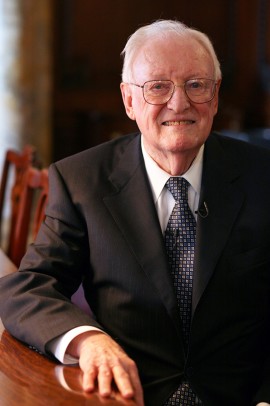Historian remembered as ‘foremost Jacksonian scholar of our time’

Robert Remini, wrote an award-winning history of the House of Representatives. Photo: Hector Emanuel
Robert Remini, 91, professor emeritus of history, an award-winning biographer and former official historian for the U.S. House of Representatives, died March 28 at Evanston Hospital after a stroke.
The New York Times called him “the foremost Jacksonian scholar of our time.”
His critically acclaimed three-volume Andrew Jackson biography took more than 15 years to complete. The third volume of the series, Andrew Jackson and the Course of American Democracy, 1833-1845, won the National Book Award for nonfiction in 1984.
Remini also authored biographies of Henry Clay, John Quincy Adams and Daniel Webster, as well as a dozen other books on Jacksonian America.
“I’m a narrative historian. I tell a story. Biography is a handy way of doing history because the chronology has already been prepared for you — a person is born and then he dies,” he said in a March 1, 2000, UIC News profile.
Fred Beuttler, who collaborated with Remini on projects at UIC and the House of Representatives, said Remini “reestablished a non-partisan professional office, which helped interpret the institution to members of Congress, teachers, scholars, the press and the general public.”
“His passion for American history influenced countless students and colleagues, and his legacy will live on in his works of scholarship and in the people whose lives he touched,” Beuttler said.
In his most recent work, At the Edge of the Precipice: Henry Clay and the Compromise that Saved the Union (2010), Remini detailed Clay’s role in orchestrating what some consider to be a lesser-known but critical moment in American history — the Compromise of 1850.
Remini was official historian for the House of Representatives from 2005 to 2010. He was appointed by Dennis Hastert, then speaker of the House.
U.S. Rep. John Larson, D-Conn., who introduced legislation commissioning the history of the House, called Remini “one of the nation’s preeminent political historians.”
“His dedication to the country and to the institution of the House of Representatives will not be forgotten,” Larson said. “I join every member both past and present grateful for his invaluable work to honor and preserve the history of this nation.”
Before Remini was named House historian, an authorization from Congress in 2002 appointed him distinguished visiting scholar in American history at the John W. Kluge Center of the Library of Congress.
During that time he produced The House: The History of the U.S. House of Representatives (2006), the first comprehensive narrative history of the U.S. House of Representatives.
In his research for the single-volume, 625-page book, Remini used the Library of Congress collection of manuscripts, congressional records, newspaper accounts, letters, diaries, memoirs and biographies. He also interviewed current and former House members.
In 2007, Remini’s book was awarded the Society for History in the Federal Government’s George Pendleton Prize, which recognizes “an outstanding major publication on the federal government’s history, produced by or for a federal history program.”
In 2008, at age 87, he was the author of two published books, the 400-page A Short History of the United States, and Andrew Jackson, which centers on Jackson’s emergence as a military leader, and co-editor of Fellow Citizens: The Penguin Book of U.S. Presidential Inaugural Addresses.
Remini received the 2004 Freedom Award from the United States Capitol Historical Society for his “outstanding contributions to preserving and communicating the history of our nation.”
Other honors included the Lyndon Baines Johnson Foundation Award, the Carl Sandburg Award for nonfiction and the American Historical Association’s Award for Scholarly Distinction.
He delivered two lectures at the White House, a Presidential Lecture in 1991 and the inaugural Heroes of History Lecture in 2003.
Remini was an active member of the national history community and a long-time review board member for the National Endowment for the Humanities.
Born in the Bronx and raised in Queens, he received his undergraduate degree from Fordham University and served in the Navy during World War II. He later earned a Ph.D. in history at Columbia University and held teaching appointments at Fordham and Columbia.
In 1965 he joined the faculty of the new Chicago Circle Campus (now UIC), serving as the first chairman of its department of history. In 1983 he became founding director of the UIC Institute for the Humanities. Later in his career he held the position of UIC historian. The office produced The University of Illinois at Chicago: A Pictorial History in 2000.
“He had a deep love and commitment to UIC and worked tirelessly to help the young institution reach its potential as one of the premier urban research universities, combining the values of access and excellence,” Beuttler said.
Donations may be made to the Robert V. Remini Scholarship Fund, University of Illinois Foundation, 1305 W. Green St., Urbana, IL, 61801.
